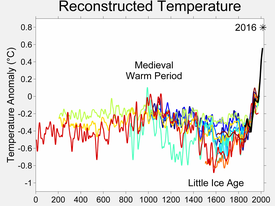The hypothesis of a delayed ice age was set out in a Scientific American article by William F. Ruddiman. Here's a link:
http://sciamdigital.com/index.cfm?fa=Products.ViewIssuePreview&ARTICLEID_CHAR=F9374686-2B35-221B-635B1D2A02A8B6D5
And another (whole article, minus graphs, for free):
http://www.atmos.ucla.edu/~liougst/Lecture/Ruddiman_SciAm_2005.pdf
Ruddiman has also written a book, which I haven't read, but is probably worth going to the library for. Here's a link:
http://www.amazon.com/gp/product/0691133980?ie=UTF8&tag=hatrackriver&link_code=em1&camp=212341&creative=384065&creativeASIN=0691133980&adid=61d4947b-1aaf-4899-94da-5a7191ecc309
Ruddiman's thesis is that humans have been altering the climate for at least 8,000 years -- and that's a good thing.
There were some compelling graphs in Ruddiman's SciAm article, which I haven't been able to find. Here's a substitute that shows that the answer to your question is "No" -- or more precisely, we've been enjoying a prolonged plateau in the cycle, which (according to Ruddiman) should have dipped into glaciation thousands of years ago.

Here's a quote from Ruddiman's SciAm article:
"My findings add a new wrinkle to each scenario. If anything, such forecasts of an "impending" ice age were actually understated: new ice sheets should have begun to grow several millennia ago. The ice failed to grow because human-induced global warming actually began far earlier than previously thought--well before the industrial era.
In these kinds of hotly contested topics that touch on public policy, scientific results are often used for opposing ends. Global-warming skeptics could cite my work as evidence that human-generated greenhouse gases played a beneficial role for several thousand years by keeping the earth's climate more hospitable than it would otherwise have been. Others might counter that if so few humans with relatively primitive technologies were able to alter the course of climate so significantly, then we have reason to be concerned about the current rise of greenhouse gases to unparalleled concentrations at unprecedented rates.
The rapid warming of the past century is probably destined to persist for at least 200 years, until the economically accessible fossil fuels become scarce. Once that happens, the earth's climate should begin to cool gradually as the deep ocean slowly absorbs the pulse of excess CO2 from human activities. Whether global climate will cool enough to produce the long-overdue glaciation or remain warm enough to avoid that fate is impossible to predict.
